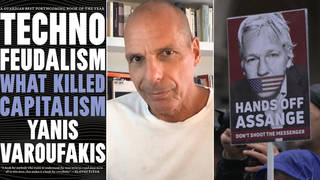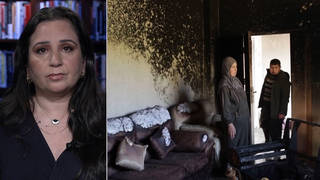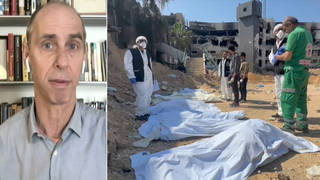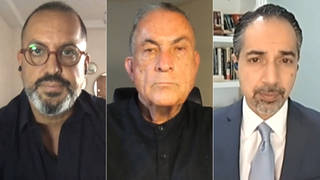
Related
We look at a controversial ballot initiative in Arizona–Prop 200–that would require all residents of the state to prove they are citizens to receive any public services and to vote. We host a debate with a local Latino community leader and one of the initiatives chief proponents. [includes rush transcript]
Today we are broadcasting from Phoenix, Arizona where immigration and homeland security issues have been the subject of debate this election year. Homeland Security chief Tom Ridge visited Phoenix yesterday to promote a public-private sector partnership, he said, to help expedite trade at the Mexican border. Ridge’s visit sparked an exchange between the Bush and Kerry camps in Arizona.
The Kerry campaign and Arizona Democrats criticized Bush and argued the White House has not done enough to deal with the needs of border communities. The Bush campaign and Arizona Republicans countered that Kerry is less in tune with border and homeland security needs in the Southwest.
In addition to the high stakes of the presidential and national elections this year, Arizona voters will also decide on a measure called the “Taxpayer and Citizen’s Protection Act,” also known as Proposition 200.
If passed, the measure would force all Arizonans to present their birth certificate or passports to receive public services and to vote. It would also require public employees to report anyone who cannot present these documents to federal immigration authorities.
Today we host a debate on Proposition 200 and immigration:
- Alfredo Gutierrez, leader of the Latino community in Arizona. He is the host on one of the most listened to radio shows in the state, “Aqui Estamos con Alfredo Gutierrez.” His show airs on Radio Campesina, a non-profit network owned by the United Farm Workers of America. He is a former State Senator and sought the Democratic nomination for governor in 2002.
- Kathy McKee, founder and Chairwoman of Protect Arizona Now, the group sponsoring Proposition 200.
Transcript
AMY GOODMAN: In addition to the high stakes of the presidential and national elections this year, Arizona voters will also decide on a measure called “The Taxpayers’ and Citizens’ Protection Act” also known as Proposition 200. If passed, the measure would force all Arizonans to present their birth certificate or passport to receive public services and to vote. It would also require public employees to report anyone who cannot present these documents to federal immigration authorities. Today we host a debate on Prop 200 and immigration. We’re joined by Alfredo Gutierrez; he is a leader of the Latino community here in Arizona. He’s the host of one of the most listened-to radio shows in the state. His show airs on Radio Campesina, a non-profit network owned by the United Farm Workers of America. He’s a former Arizona state senator and sought the Democratic nomination for governor in 2002. We’re also joined by Kathy McKee; she is founder and chairwoman of Protect Arizona Now, the group that is sponsoring Prop 200. We welcome you both to Democracy Now!
KATHY McKEE: Thank you.
AMY GOODMAN: Let’s begin with Kathy McKee. Kathy, what is Proposition 200? Where did it come from, who wrote it?
KATHY McKEE: It started with my local group, Citizens Against Illegal Immigration, discussions back in 2002, when we tried to decide how we could get our government to enforce our laws. We took it to several attorneys, who specialize in initiative and constitution law. That’s what it came up with. Actually, what you said wasn’t totally true about having to present your passport or birth certificate to collect benefits, because you only have to prove eligibility to collect benefits. The citizenship part is to register to vote.
AMY GOODMAN: So, what are the main tenets. What do you think is most important for people to understand about Prop 200?
KATHY McKEE: Well, that the honor system is not working in our state. You have to have identification to go to Blockbuster and get a video rental card. You have to have a ton of identification and information to enroll your children in Little League. You have to have identification to go to the Phoenix city dump, yet you can register to vote from your kitchen on your computer. You can call up and get a mail-in ballot and you can mail in your vote. You’ve never shown your face, much less any identification. 90% of the people in the state believe that it’s more important to show identification to vote than it is to go to the city dump, and they really support that.
AMY GOODMAN: Alfredo Gutierrez, your response to Prop 200, what you see as the issues.
ALFREDO GUTIERREZ: If voting were the issue and showing identification, I doubt that there would be much controversy. What this does is creates two sets of voters. Voters who can vote at home, as Kathy says, just simply do it through computers, and voters who go to the polls. In that instance, they will have to show a higher level of identification. Two sets of voters. Two sets of criteria for participating in democracy. Simply unacceptable. But set that aside, because again, they could correct that by simply doing something reasonable. The public benefits side, recall, to obtain any public benefit, and they do not define public benefit, you have to demonstrate that you are either a citizen or a legal resident. That has to be verified by the federal government, by the way. It isn’t a matter of presenting a document. It’s a matter of having the federal government now decide whether a local community may provide you with water, with police service, fire service or library card. The real danger in all of this, of course, is that if young people, for example, with children — children stop getting immunizations. The danger to all of us, if we walk into a third world circumstance in health care, simply because these people are frustrated, immigration — my final point is we’re all frustrated with immigration. Immigration clearly is a major issue in the state of Arizona. We have to resolve it. So, do we listen to John McCain or listen to these folks? Their national chair is a member of the White Citizen’s Council, is on the editorial board of the Occidental Quarterly, a very anti-Semitic and separatist organization. They don’t call themselves racists. They refer to themselves as separatists. That’s who’s behind this. They are using Arizona as a guinea pig state.
AMY GOODMAN: Your response, Kathy.
KATHY McKEE: That is so irrelevant. Those groups — I have never even heard of them before this extremist brought it up in a smear campaign. We don’t support those groups. They don’t support us. They’re irrelevant. Are we going to bring up the fact that I’m a member of the NRA or Sierra Club? Because we don’t support them and they don’t support us, either. It’s also not true that we don’t define benefits. The initiative clearly states we are amending only Title 46, and that is the welfare statute in Arizona. There’s a list of four pages of welfare programs under Title 46. That’s all we’re amending. We’re not talking — we have exempted federally mandated programs such as childhood immunizations, emergency room treatment, K through 12 education. So, this spin, out of due respect to Mr. Gutierrez, is just not true.
AMY GOODMAN: I’m looking at the Arizona Daily Star, and it says, “Protect Arizona Now, the campaign to limit government services to people who cannot prove US citizenship, named a self-described separatist to head its national advisory board. Virginia Abernathy said Chicago reports that called her a white supremacy leader is pretty foolish.” And then it quotes her from her Tennessee home saying, “I would say that like many other people in most ethnic groups, I like to be with my own kind. So it would be accurate to say of me and many others, that I’m a separatist.” She is the chair of the national advisory board.
KATHY McKEE: Of the advisory board. Well, again, that’s extraneous to Protect Arizona Now. And it’s a diversionary tactic, that we have eight pages on our Web site. Also that article is also wrong when it says it requires proof of citizenship for benefits. Well, she’s just going in a dated way of saying that she supports multiculturism, which is kind of like a buzzword now. It’s not e pluribus unum now.
AMY GOODMAN: That she supports multiculturalism?
KATHY McKEE: That’s exactly what that says.
AMY GOODMAN: As a separatist.
KATHY MCKEE: Groups that are trying to put a negative spin on this must think it’s not okay to have the NAACP, it’s not okay to have the Southern Christian Leadership Council, it’s not okay to have the Baha’i Faith. All of that is so irrelevant to Protect Arizona Now. Let’s talk about the initiative, because what she does with her private life and her beliefs are so … you want to talk about vegetarianism? Because I’m a vegetarian. That’s what we’re doing here.
AMY GOODMAN: Alfredo Gutierrez.
ALFREDO GUTIERREZ: It’s silly to compare the NAACP to the Ku Klux Klan. The White Citizen’s Council is a direct inheritor of the Ku Klux Klan. This lady is an active member of the White Citizen’s Council. She’s an active member or an active board member of the Occidental Quarterly, virulently anti-Semitic. It’s absolutely relevant that these national organizations, these hate organizations, have come here, manipulated local citizens on an issue that is unquestionably a major issue that has to be resolved in the state. And does so in a hate-filled fashion. Public benefits is not defined. Kathy is right. They went to that title. They could have defined it or limited it to the title of welfare. They did not. One has to assume that the lawyers they talk about, and these hate groups, these national hate groups that assisted her, read and write. One has to assume that they understood precisely what they were doing. What they were doing is defining public benefits to include library cards, water, parks. The city of Phoenix attorney has ruled that this will affect public parks and presumably — and presumably, the city attorney of Phoenix says we will now have people running around asking for you to — for your identity to be federally verified before you can use a public park. Isn’t that silly? That’s silly. Immunization is not. That’s serious. A fire in the house next door is not. That’s serious.
AMY GOODMAN: Kathy McKee says immunizations are not included.
ALFREDO GUTIERREZ: Kathy McKee is wrong and she ought to read her own document. What is — she is right about one thing. They have waived emergency health care due to federal law. But they have not waived any other programs. So, immunizations that are provided by the state of Arizona, funded by the state of Arizona, or any public political subdivision thereof is indeed covered. Only emergency health care is exempted. Immunizations are not defined as an emergency provision of health care.
AMY GOODMAN: You’re laughing, Kathy McKee.
KATHY McKEE: Well, talk about hate groups. This is the last statement I’m going to make on this. Our opponents are supported by La Raza, the Mexican consulate, the Mexican governments. You want to talk about subversive hate groups. Let’s not get into these groups that are supporters of ours. We have no control over who supports what. Those are the real hate groups. Look at the internet and see who’s asking for the extinction of brutal gringos. It’s certainly not anybody that we support or supports us. He’s dead wrong about the benefits. The initiative could not be any clearer. Look it up on the internet. It’s on our Web site. It says, we are only amending Title 46. The word — public benefits comes about under 8 USC, we are exempting federally mandated benefits. Under 8 USC, that is the federal law that tells what benefits are federally mandated. That term comes from what we’re exempting. That’s why we have to use that term. He is mistaken if he thinks it’s only emergency medical care or stabilization. It’s K through 12, it’s immunizations, it’s disaster relief. There are several things. School lunch programs that are in that federal law. And under the — initiative, again, look at the clear language of Section 6, which is the benefits part of our initiative, and it couldn’t be any clearer to say Title 46 is amended, only, and we’re only adding a subparagraph of a subsection. That’s why we’re not starting with new definitions.
AMY GOODMAN: Alfredo Gutierrez.
ALFREDO GUTIERREZ: Abernathy is their chairman. Let’s be clear about this. White Citizen’s Council, Occidental Quarterly, their chairman is a member of the White Citizen’s Council, direct inheritor of the Ku Klux Klan. We didn’t name her; they did. Let’s set that aside because she is indeed allied and a member of national hate groups that are here. As to the — the issue of benefits, one can believe Kathy’s version of this, or you can believe the city attorney of Tucson.
KATHY McKEE: Believe your own —
ALFREDO GUTIERREZ: The city attorney of Phoenix, the Attorney General of the state of Arizona, all of whom have looked at that and defined it as — as having this broad application. Finally, you can look for a resolution to this immigration issue, and it is indeed an issue. Resolution of this issue to people like the White Citizen’s Council, like the Ku Klux Klan, like Kathy, or you can listen to John McCain, who is absolutely opposed to this, because it does nothing to resolve the immigration issue in Arizona and just simply sows division and hate in this state.
AMY GOODMAN: Well, what about that? Senator John McCain, the Republican major supporter of President Bush, has come out opposed to Prop 200.
KATHY McKEE: Isn’t that the same John McCain who has been in the senate for 16 years and hasn’t done squat about this issue except let it get 1,000 percent worse under his watch? I have spoken at dozens and dozens and dozens of citizen meetings and dozens and dozens of Republican meetings. I have yet to come across a person who gives a twit what he thinks about this issue. He has made himself irrelevant when he goes against 85% of his own constituents.
AMY GOODMAN: Well, let’s talk about that. Let’s talk about the level of support for Proposition 200. It looks like, Alfredo Gutierrez, it’s going to win.
ALFREDO GUTIERREZ: I don’t agree with that, obviously, but first of all, on Senator McCain, Senator McCain is perhaps the most public or rather the most popular politician in Arizona, by far. But the entire congressional delegation, majority Republican, very conservative in Arizona, is opposed. The entire delegation, every one of them, is opposed to this. So, this isn’t simply McCain. They can try to make a — satan-ize McCain. It’s the entire delegation. To the issue of whether it’s popular — look what people are responding to is the terrible issue we have at the border, unquestionably and something has to be done about it. We all agree on that. Even myself and this separatist Abernathy, you know, even us and the hate groups agree on that. Something has to be done at the border. But this isn’t it. This does nothing about immigration. This merely jeopardizes ourselves, our health, in the process of their hate-filled anger. H.L. Mencken once wrote that for every difficult and complex problem there is a simple and direct solution. That’s wrong. And that’s what you have here. A very wrong solution to a very real problem.
AMY GOODMAN: What about the public employees? How would they be dealt with by Prop 200?
ALFREDO GUTIERREZ: Well this is one of the more bizarre and hate-filled parts of this. A library clerk — a library, upon having somebody who does not have appropriate verification of the federal government that they’re here in one fashion or another, will be forced to write a written report reporting that family. Now, the library in having the application will have the address, etcetera, the whole family. They’re going to send it over. And they’re going to come back for the family, presumably, and take them away. Shades of Nazi Germany. But, if the librarian chooses not to do that, they have cleverly made it a crime, subject to four months of imprisonment, if she does not do it. Now, finally, if the city of Phoenix or the city of Mesa decides that’s a draconian provision, we are not enforcing it, they have written in this that any citizen can go to court, can go to court and that civil action will have preference over all other actions before the court. So, the court is listening to a domestic violence issue, for example, it has to set it aside. So, they can listen to the case of the librarian who refused — presumably — to send over and turn in this family for deportation. This is an absurd proposition that only these hate-filled groups could have thought of.
AMY GOODMAN: I’m going to get your response, Kathy, after a break.
KATHY McKEE: Oh, please.
AMY GOODMAN: We are talking about Prop 200. The polls indicate that it could well win, and be passed on election day. We’re talking to Alfredo Gutierrez, who is one of the leading opponents of Prop 200. And we’re also joined by Kathy McKee, who is one of the leaders and shapers of Prop 200 in the state, the founder of Protect Arizona Now. We’ll also play a clip of President Bush on immigration when he was speaking on Fox’s O’Reilly Factor, speaking with Bill O’Reilly. This is Democracy Now!. We are broadcasting from Arizona, and we will be back in a minute.
AMY GOODMAN: We are broadcasting from Phoenix, Arizona. The last presidential debate will be taking place here. We’re talking about Prop 200, which will be voted on on Election Day, around immigration, and also is being looked at around the country as a model for other propositions that could be introduced in other states. Our guests to debate the issue are Kathy McKee, founder and chair of Protect Arizona Now, the group that is sponsoring Proposition 200 and Alfredo Gutierrez, who is a leader of the Latino community here in Arizona; host of one of the most listened-to radio shows on Radio Campesina, a non-profit network of the United Farm Workers of America; former Arizona state Senator, ran for governor in the 2002 election; was a democratic—sought the democratic nomination for governor. Prop 200 — before we go to Bush speaking to Bill O’Reilly, Kathy McKee, did you want to respond to what would happen to public employees if they didn’t turn in immigrants who didn’t have the proper documentation?
KATHY McKEE: Thank you so much for your kindness and balance. Again, there are no welfare programs under Title 46 that provide for free library cards — they’re already free — or hunting licenses or access to public parks. None of the programs that the people are talking about are even remotely connected to our initiative. They could never be construed to be. They act like the criminal thing is something new, when actually A.R.S. 46-140-C, part of the same statute that we’re amending already makes it a misdemeanor for any state employee or their supervisor, if applicable, not to file a report — a written report for welfare fraud. The problem is, is that the Welfare Department has an internal policy, which is right there on their applications that forbid their employees from reporting welfare fraud if it relates to an illegal alien. So, we have to talk about two sets of standards. We have a law that says that you have — employees have to report welfare fraud, but then we have an internal department policy that says, oh, but you can’t report them if it relates to a certain class of people, namely people who shouldn’t be here.
AMY GOODMAN: And has there been a big problem with welfare fraud?
KATHY McKEE: We hear from welfare workers all the time. I was on a radio station in Payson and some people from the welfare fraud department called up to say it sounds impossible what that woman is saying, but it’s true. We cannot report — we cannot investigate or report welfare fraud if it relates to illegal aliens.
AMY GOODMAN: And voter fraud, a great deal of problem with immigrants going to the polls that shouldn’t be voting?
KATHY McKEE: How do you know? Because we have had an arrest in El Mirage and a conviction of two people there. And in Eloy, there were nine people on 85-count indictment for voter fraud.
AMY GOODMAN: They were immigrants?
KATHY McKEE: They were all sorts of types. The two in El Mirage were illegals and had been voting as illegals for years. The ones in Eloy were that and dead people voting, and several different things. The point is that that’s still 2,000 percent more than the number of employers that are sanctioned in this state for hiring illegal aliens because virtually zero have been sanctioned or fined in five years. Everybody knows that’s going on every minute of every day.
AMY GOODMAN: Alfredo Gutierrez.
ALFREDO GUTIERREZ: Let me go back to this issue of what benefits are covered. Again, the city attorney, the attorney general, the city attorney of Tucson and the city attorney of Prescott all disagree with Kathy McKee. It will have this immense and broad application. We are talking about librarians. Voter fraud is not an issue, but if they want to have identity for it, fine. But it’s not an issue. People are not coming here from Mexico and Honduras so they can vote for George Bush or John Kerry. That’s not why they’re coming here. They’re coming here to work. It’s just simply not an issue, but again, if that’s what they wanted to do, but even there, what they’re really seeking to do, and Kathy said at the beginning of this program, stopping people from voting at home. They want to do away with early voting in this state. They want to do away with the process of vote by mail in this state.
KATHY McKEE: Not true.
ALFREDO GUTIERREZ: And they — they have found a unique and interesting way of doing it.
AMY GOODMAN: I wanted to play for you President Bush being interviewed by Bill O’Reilly, commenting on immigration.
BILL O’REILLY: Every year 3.5 million illegals come over. Why can’t the federal government control that?
GEORGE BUSH: Well, as you know, I was the governor of Texas. I was very aware of this issue. There is a long border that makes it harder to control. We have beefed up places along the border to stop the process of —
BILL O’REILLY: In all due respect, that’s not working. 3 million people.
GEORGE BUSH: It’s working better. They have done a good job in Arizona, which is a main border crossing. I was trying to get my words here for a minute. Trying to give you facts that would — I think there’s 1,000 more border patrol agents along the border. We’re modernizing border techniques. We’re using better surveillance methods to stop the crossing at the border. Now, look, people are coming because they want to work. You know that. Family values don’t stop at the border.
BILL O’REILLY: Absolutely.
GEORGE BUSH: If you can make 50 cents in the interior of Mexico and $5 in the interior of the United States, you’re coming from the $5.
BILL O’REILLY: 90% of them are, but 10% are bad guys. A lot of bad guys coming in.
GEORGE BUSH: I don’t know how you got the 10% number.
BILL O’REILLY: The border patrol, incarceration, violent crime, that.
GEORGE BUSH: No question about it. It is a serious issue. I happen to believe that the best way to enhance the border is to have temporary worker cards available for people. And I think it’s best for the employers who are employing these people. I think it’s best for the employees that are trying to find work. The long term solution for the issue on the border is for Mexico to grow a middle class. That’s why I believe in NAFTA.
BILL O’REILLY: We’ll be in the grave.
GEORGE BUSH: I don’t think so. It’s happening. Look, I wish I could have taken you down there and shown you the northern tier of states in Mexico ten years ago compared to today. It’s happening. Free trade helps lift lives. Free trade develops commerce. Free trade gives people a chance to realize their dreams. So long as the wage differential is as big as it is, and so long as moms and dads feel the necessity to feed their children they’re going to come and try to make a living.
BILL O’REILLY: So you’re not going to militarize the border to stop?
GEORGE BUSH: No. We’re going to use the border patrol and beef it up and give it better technologies and better equipment to do its job.
BILL O’REILLY: Okay. You know a lot of people are not going to like that answer. You know that.
GEORGE BUSH: It’s a truthful answer. As opposed to what? Putting a military on the border?
BILL O’REILLY: Yeah, a military to back up the border patrol. To stop the rampant —
GEORGE BUSH: No, I think the best way to do it is give the border patrol the assets it needs to do its job.
AMY GOODMAN: President Bush being interviewed by Bill O’Reilly on Fox. We’re going to end with your comments on this. We’ll begin with Kathy McKee, the — what can we say, the mother of Prop 200?
KATHY McKEE: That’s what they call me. The President is in la- la- land and needs to get back on the turnip truck. If he thinks that these people are coming here just to work. With 33%, this is what Lou Dobbs says 33% of our prisons are comprised now of non-citizens, 36% to 40% of illegals are on welfare. So, a fair number are coming here for crime and welfare. But, regardless, employment is not an excuse to disobey our laws. So, the motive for coming here is irrelevant. We still want our laws enforced, which is exactly what Protect Arizona Now is about, enforcing our laws.
AMY GOODMAN: Alfredo Gutierrez.
ALFREDO GUTIERREZ: That’s — these sort of absurd statistics that they sort of make up are interesting. There have been a number of studies at a national level on the issue of welfare fraud. It simply is not true that that‚s the case. But again, even if that were the case, then what we need is to do something about immigration at the border. We agree on that. This does nothing about that. This is the invention of some hate-filled groups that want to come up with really a pretty evil process of hurting people. It does nothing about the border. It does nothing about immigration. What it does do is have extraordinary unintended consequences, and those are the consequences that even shock Kathy when she hears them because they didn’t think about them. I’m sure that the folks at the White Citizen’s Council did, but they forgot to tell her. She’s still stunned that every — every attorney general in the state of Arizona says that it’s going to affect immunizations, water, library cards, police service and fire service.
AMY GOODMAN: Do you think it will make some citizens afraid to vote?
ALFREDO GUTIERREZ: I — I think that it will — the effect on voting will be that it’s going to do away with early voting in Arizona. We’re all going to line up at the polls again. That’s going to be the impact on voting. Half of the state votes by mail. That half of the state will not have to show up at the polls.
AMY GOODMAN: On that note, I want to thank you both very much for being with us, Alf redo Gutierrez a leader in the Latino community in Arizona, has his own radio program on Radio Campesina which is run by United Farm Workers of America, former Arizona state Senator. Kathy McKee, founder of Protect Arizona Now, the group that is sponsoring Prop 200. This is Democracy Now!












Media Options